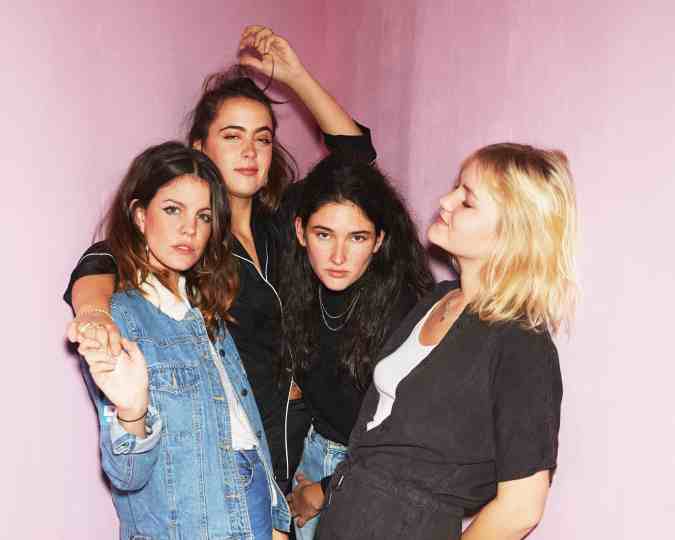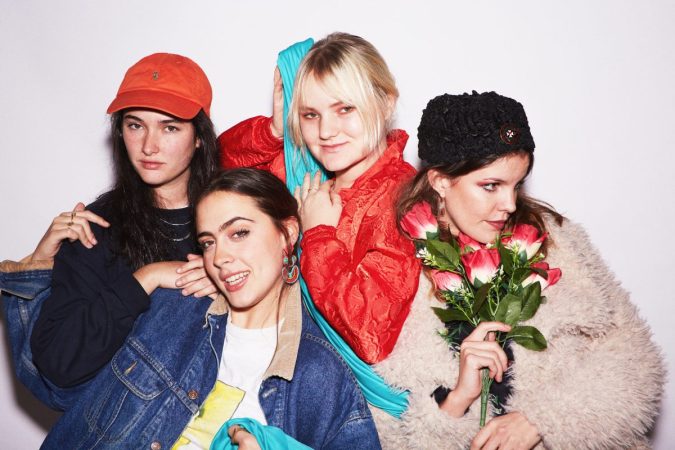It’s hard to find a band having as much fun as Hinds. The garage-rock four-piece from Madrid has been slinging boozy tales of parties had and to be had, basking in the good fortune that saw them plucked from relative obscurity in Spain to travel the world. Their debut LP Leave Me Alone was brash and bitter, but also often tender and sweet, with a sound that evokes the basements of Middle America more than it does the Iberian peninsula.
The source of Hinds’ scuzzy garage sound is a mix of equal parts taste and resources. They love the lo-fi scruff of garage, but it’s also an aesthetic within reach when you’re just starting out and don’t have tons of cash for gear. Leave Me Alone was a record put together by a band still learning how to record; for I Don’t Run, their new LP on Mom + Pop Records, they had label backing, a mixing engineer, and the help of The Strokes producer Gordon Raphael to help them achieve whatever sound they wanted. But finding the right balance was tricky.
“It’s still dirty, but it’s elegant at the same time,” says bass guitarist Ade Martin. “At the beginning we thought ‘Shit, this is too dirty.’ We had some serious conversations about it. ‘Maybe this is too much.’”

It’s definitely not too much. With I Don’t Run, Hinds has recorded proof of their maturation. With songwriting and performance chops forged in the fire of a whirlwind world tour, they’ve rightfully earned their place in U.S. garage alongside contemporaries like Mac DeMarco and Ty Segall.
“What hurts me the most is when press people describe our sound only with bands with women.”
While Hinds may have sprouted from its sonic roots in U.S. garage, the band’s attitude and ethos is distinctly of Madrid — specifically, the hang-out culture in the Plaza Dos de Mayo, a massive public square in the city center. Filled with bars and cafes with outdoor terraces, young people are always hanging out in the Plaza, where the drinks are cheaper than the bars and you can smoke to your heart’s content. It defined their social circle early on, as it’s where they would meet up and hang with other musicians, like the guys in Los Nastys and The Parrots. Their first records captured the loose, carefree vibe of that scene; they really did seem like they were having more fun than anyone else.
But with their rapid rise to indie fame and subsequent world tours, they hadn’t really gotten to spend much time together in Madrid, until this past summer when they hunkered down to record. But this time, things were different than those halcyon days. They were older, wiser, and world-weary from their time on the road. “In reality we haven’t spent so much time in Madrid, since before the band,” guitarist Ana Perrote says. “That was a long time ago, we were different people back then; now it’s the first time and we all are enjoying it.” This time around, they were surrounded by their peers in other bands, motivating and collaborating with each other. The photographer who shot the album cover, the designer of the packaging, the producer of the records…each came from their circle of friends in Madrid. They motivated each other to work hard, and try to lift each other up. They work on each other’s records. “Whenever we put out a song they go, ‘Oh fuck, I got to work,” and whenever they put out a song, we go, ‘Oh fuck, we have to work…you finished already?” says Perrote.
Part of the shift in the dynamic comes from the complications of their success. Being the one band from their group of friends to experience outsized success meant more attention, more scrutiny…whispers from people in their scene questioning if this group of women who were new to the scene deserved experiencing more success than the guys who had been grinding for years. “It was this new thing that nobody knew about, and suddenly it became a monster,” Martin says. “No one was expecting that. It was always a weird feeling…we never doubted that we deserved it, but I felt bad about it sometimes.” But as they continue to work, those whispers grow quieter.
Even outside of Madrid, being a rock band of young women means they get relegated to music’s pink ghetto, pitted against other women as if they must compete for the limited amount of space their gender is allowed to occupy in music.
“People would come to our shows and say to us, ‘I like MOURN better,’” Perrote recalls. “Okay! What do we have to do with it? It’s totally different music from a different city.” Guitarist and lead singer Carlotta Cosials adds, “What hurts me the most is when press people describe our sound only with bands with women.” Aesthetically, they see themselves as more in line with Glass Animals, or The Black Lips, bands with similar guitar tones, scuzzy vocals, and high-energy shows that just happen to be exclusively composed of men.

“[When] Hinds took off, it was really, really tough,” Perrote admits. “A lot of opinions, a lot of critics, on social media, in magazines. It was people that we knew, and it was really really tough. A lot of it had to do with the fact that we were girls. ‘You don’t see girls doing DIY music or punk…’”
“When Hinds took off, it was really, really tough.”
“Or referring to our physical appearance,” Grimbergen adds. “‘They’re not even that hot,’” Cosials remembers hearing. “That was the sentence. Come on, man!”
While sexism in the music industry is far from cured, they’ve admitted that they don’t struggle with the nonsense as much anymore. “I don’t know if things changed or we don’t notice anymore,” Martin says. “We don’t care anymore.”
Madrid is far from the center of indie rock — even in Europe — so for a band looking to make a career out of music, the obvious choice would appear to be a move to London or New York. But the Spanish capital’s distance from the industry is part of its appeal to Hinds. They’ve gotten a taste of the partying and industry hobnobbing, and can imagine that life spiraling out of control.
“I think being in Spain and being apart from all the music world is what makes us what we are,” Perrote says. “We see so much drinking and so much drugs and it’s always an excuse…same in New York. And it’s really cool to go back to Spain and not talk about what label are you signed to. [Madrid] keeps us straight and in touch with who we are.”
“It keeps us close to the ground,” Cosials adds.
The band is attuned to the expectations of young women in Spanish society — to be responsible, have jobs, marriages, families — and wholeheartedly reject them. They’re young — everyone in Hinds is still in their 20s — and have no intention of growing up any time soon. When I ask them what happens when Hinds is successful enough that it feels like a job, the response is immediate:
“It does.” Martin replies. “And it’s the best thing ever.”
Hinds’ I Don’t Run is out now via Mom + Pop.




